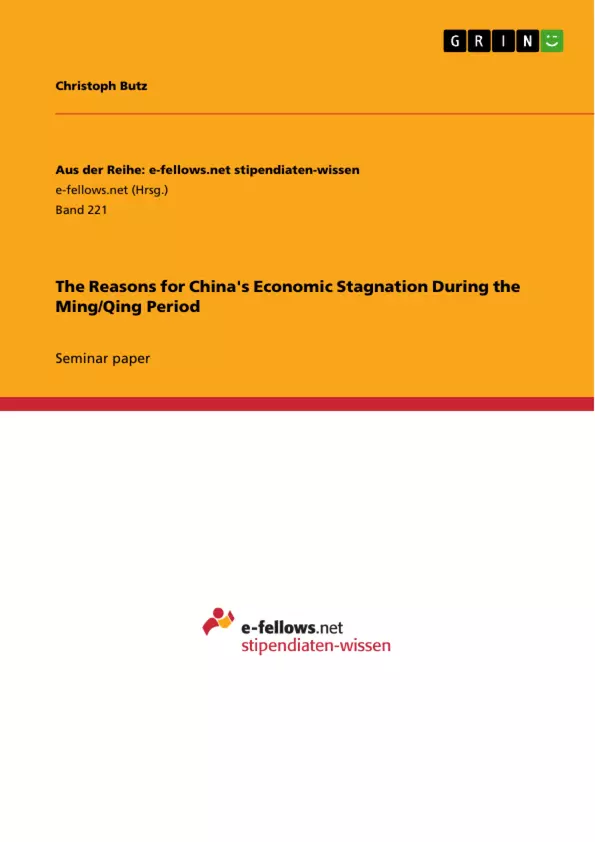The industrial revolution in Europe, or more precisely, in Britain changed the global economy substantially. Major changes in agriculture, manufacturing, mining and transport through technological innovations led to a shift of global economic dominance from China to Europe between the 18th and 19th century. Until that point, China has been the largest and most efficient market-economy in the world, leading in agriculture, transportation and innovations. Every major contribution that led to the industrial revolution in Europe was also prevalent in China, but still the country did not do the next step forward and was overhauled by Britain quickly.
The objective of this paper is to examine the reasons why an industrial revolution did not occur in China during the Ming/Qing period, although it was the leading economy in the world. Therefore, the first section will shortly outline the economic development of China before the 14th century. Thereafter, two different theories about the reasons for China’s stagnation will be explained, before a critical evaluation of both theories will be provided. Last, a conclusion will summarize the main findings of this paper and give an outlook on future debates.
Inhaltsverzeichnis (Table of Contents)
- Introduction
- Economic Development in China until the 14th Century
- Reasons for the Chinese Stagnation after the 14th Century
- Elvin's High-Level Equilibrium Trap
- Pomeranz's Reasoning
- Evaluation of the Theories
- Conclusion
Zielsetzung und Themenschwerpunkte (Objectives and Key Themes)
This paper aims to explore the reasons behind China's economic stagnation during the Ming/Qing period, despite its earlier prominence as the world's leading economy. It examines why an industrial revolution did not occur in China, despite its advanced state in various sectors.
- China's economic development before the 14th century
- Theories explaining China's stagnation after the 14th century
- Elvin's High-Level Equilibrium Trap theory
- Pomeranz's alternative explanations
- Critical evaluation of these theories
Zusammenfassung der Kapitel (Chapter Summaries)
The paper begins by outlining China's economic development before the 14th century, highlighting its transition from a primarily agrarian society to a market-driven economy during the Tang and Song dynasties. It emphasizes China's advanced agricultural techniques, efficient transportation systems, and early innovations in various fields. The subsequent chapters delve into the reasons for China's economic stagnation after the 14th century. Focusing on Elvin's High-Level Equilibrium Trap theory, the paper explores his argument that China's economic prosperity itself became a barrier to industrial revolution, as the existing system, while highly efficient, offered little incentive for further growth. It also examines Pomeranz's contrasting explanations, which emphasize factors such as environmental constraints and access to resources.
Schlüsselwörter (Keywords)
This paper focuses on the economic history of China, examining its pre-industrial development, stagnation during the Ming/Qing period, and comparative analyses with Europe's industrial revolution. Key concepts include market economy, high-level equilibrium trap, agricultural technology, resource constraints, and the role of innovation in economic growth.
Frequently Asked Questions
Why did China's economy stagnate during the Ming/Qing period?
The paper explores various theories, including environmental constraints and socio-economic traps, to explain why China did not experience an industrial revolution like Britain did.
What is Elvin's "High-Level Equilibrium Trap"?
It is a theory suggesting that China's traditional economy was so efficient and balanced that there was little incentive or profit-based pressure to innovate technologically or move towards industrialization.
How does Pomeranz's theory differ from Elvin's?
Kenneth Pomeranz emphasizes factors like access to natural resources (like coal) and the impact of environmental constraints rather than just internal market efficiency.
Was China economically advanced before the 14th century?
Yes, during the Tang and Song dynasties, China was the world's leading market economy, excelling in agriculture, transportation, and early technological innovations.
What are the key themes of this economic analysis?
Key themes include the comparison between China and Europe, the role of resources in industrialization, and the evaluation of historical stagnation theories.
What keywords define this paper?
Market economy, Ming/Qing period, industrial revolution, agricultural technology, and High-Level Equilibrium Trap.
- Citar trabajo
- Christoph Butz (Autor), 2009, The Reasons for China's Economic Stagnation During the Ming/Qing Period, Múnich, GRIN Verlag, https://www.grin.com/document/178105



